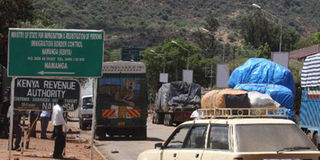Free border trade? Not yet

Namanga town on the border of Kenya and Tanzania. Photo/FILE
The days are numbered for a smuggling ring that has thrived across Kenya’s borders for years. It was supposed to have died last week but, given that old habits die hard, the black marketeers are still running their businesses in a shadowy style.
With the coming into force of the East African Community Common Market Protocol, the region is officially supposed to begin enjoying the benefits of the free movement of goods and services across the borders. However, many traders are uncertain whether the new regulations have actually taken effect.
Spot check
A spot check at Isebania on the Kenya-Tanzania border found that some Kenyans continued to smuggle beauty products through panya routes to avoid arrest. The protocol is likely to force such traders out of business since their kind of merchandise will now be readily available in Kenyan markets.
Even after the protocol officially came into force, trailers transporting goods still queued for several hours to be cleared by customs officials on both the Kenyan and Tanzanian sides.
“These people seem ignorant of the contents of the protocol. They need extensive induction; otherwise it will take ages before we start enjoying benefits of the free market,” said Mohammed Bilal, a Tanzanian trader.
Another businessman, Moran Mwita, complained: “We cannot trust what the government is saying in Nairobi … these people love money so much and will not let us pass simply because of the free market protocol”.
Their expectations are not unrealistic. With the anticipated free movement of goods and services under the common market protocol, truck drivers will no longer have to queue.
Competition for employment opportunities will heat up as the unemployed cross borders in search of jobs.
Meanwhile, Tanzanians in Tarime District are still cagey about the possible benefits of the common market protocol. They say competing with Kenyans and Ugandans in one regional labour market will be a daunting task.
Meanwhile, there was no visible free movement of people, goods, labour nor services at the Isebania border post.
Kenyans headed for Tanzania and the neighbours coming into the Kenya were “still being asked questions” by the immigration and revenue authority officials at the border post.
Officials said they had stopped vetting Kenyans except “we are still studying finer details of the protocol”.
“You should not expect benefits immediately. It will take some time for everybody to domesticate the new system,” said an official who asked not to be named because he is not authorised to speak to the media.
Kenya’s minister for the East African Community Amason Kingi said although the EA member states had ushered in a common market policy, full implementation will be a gradual process likely to take as long as five years.
He said there had been a misconception that once the protocol took effect, member countries would feel the benefits immediately.




